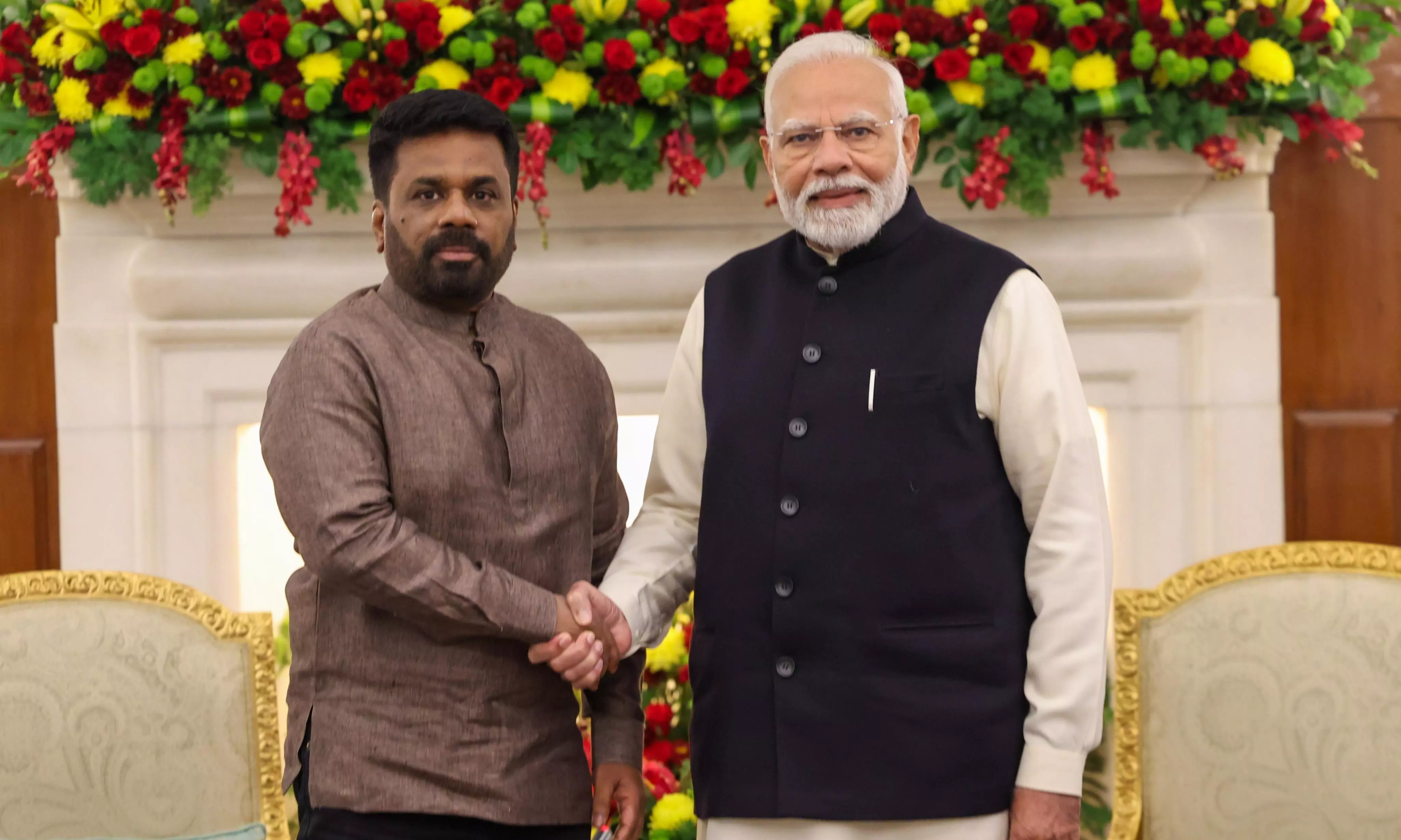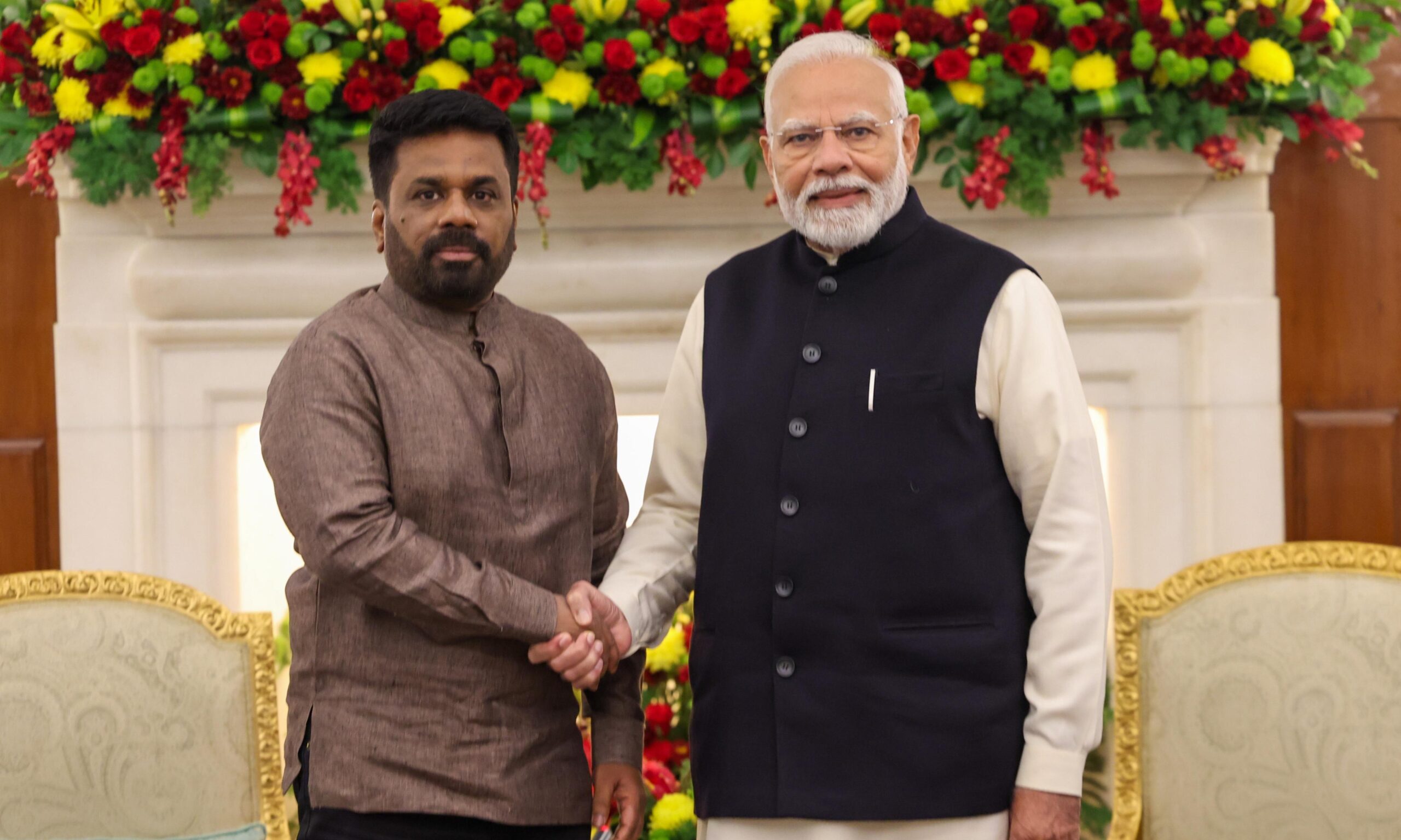
New Delhi: Prime Minister Narendra Modi on Monday held talks with Sri Lankan President Anura Kumara Dissanayake in the national capital, with both nations acknowledging the benefits of the India-Sri Lanka Free Trade Agreement (ISFTA) and consenting to strengthen trade settlements in their respective currencies. The two nations also adopted a futuristic vision to expand their partnership, resolved to soon conclude a defence cooperation pact and decided to ramp up energy ties by establishing electricity grid connectivity and multi-product petroleum pipelines.
Pointing out that India had so far given $5 billion, including lines of credit (LoC) and grant assistance to Sri Lanka, Modi emphasised that physical, energy and digital connectivity were key pillars of bilateral relations.
“Both leaders agreed that a strategic shift from debt-driven models towards investment-led partnerships across different sectors would ensure a more sustainable path to economic recovery, development and prosperity in Sri Lanka”, a joint statement said, adding that “the leaders instructed officials to finalise discussions on the bilateral MoU on Debt Restructuring”.
The two nations inked two pacts, including one on a protocol to avoid double taxation and another for training of Sri Lankan Civil Servants.
Even as Beijing maintains a formidable economic presence in the island nation, Modi announced several measures aimed at benefiting the island nation. These included grant assistance of nearly $15 million for a railway signalling project in the Maho-Anuradhapura section, the supply of LNG from India to Sri Lankan power plants, the establishment of a high-capacity power grid interconnection, and trilateral cooperation among India, Sri Lanka, and the UAE to implement a multi-product pipeline for affordable and reliable energy. The two countries also agreed on joint development of offshore wind power potential in the Palk Straits. The PM also reiterated India’s “consistent support” to its maritime southern neighbour in times of need as a “trusted and reliable” partner.
On defence and security ties in what is seen as the backdrop of growing Chinese strategic footprints in the seas around Sri Lanka, New Delhi and Colombo “recognised their shared security interests and acknowledged the importance of regular dialogue based on mutual trust and transparency and giving primacy to each other’s security concerns”.
They also emphasised giving primacy to each other’s security concerns. Both nations committed to ensuring a free, open, safe, and secure Indian Ocean region, with India being Sri Lanka’s closest maritime neighbour.
Speaking after meeting Modi, President Dissanayake assured that his country’s territory will not be used for any activity that is detrimental to India. He welcomed Modi’s assurance of India’s support for Sri Lanka’s territorial integrity and sovereignty. Both leaders agreed to advance maritime and security collaboration, including efforts to conclude a framework Agreement on Defence Cooperation apart from “provision of defence platforms and assets to augment Sri Lanka’s defence capabilities”.
On the trade front, the two leaders “appreciated that the India-Sri Lanka Free Trade Agreement (ISFTA) has enhanced the trade partnership between the two countries” and agreed to “continue discussions on the Economic & Technological Cooperation Agreement and the need to continue discussions for the early finalisation of the proposed bilateral social security agreement”.
India also announced a “financial assistance scheme to 100 new students each annually from University of Jaffna and Eastern University until the end of academic courses of the beneficiaries”.
Underlining the importance of connectivity, Modi said a decision was taken to initiate a ferry service between Rameshwaram and Talaimannar.
“We have jointly decided that, post the successful launch of the Nagapattinam-Kankesanthurai ferry service, we will also initiate a ferry service between Rameshwaram and Talaimannar,” he said.
The Prime Minister said he and the Sri Lankan leader also deliberated on the fishermen issue and agreed that a “humanitarian approach” should be adopted on it.
In his remarks, Modi hoped that the Sri Lankan government would fulfil the aspirations of Sri Lankan Tamils, including obligations on constitutional provisions and provincial council elections while pursuing a policy of both reconstruction and reconciliation.
The Tamil community in Sri Lanka has been demanding the implementation of the 13th Amendment that provides for devolution of power to it. The 13th amendment was brought in after the Indo-Sri Lankan agreement of 1987.
President Dissanayake thanked Modi for India’s multi-faceted support to stabilise Sri Lanka’s economy, including emergency financing and forex support amounting to $4 billion. He also conveyed his deep appreciation for India’s crucial role in Sri Lanka’s debt restructuring process and the Government of India’s support in settling payments due for projects under existing LoCs.
The Sri Lankan President acknowledged India’s continued support for ongoing projects despite the country’s debt restructuring process. He thanked India for extending financial assistance of (about) $20 million to settle payments due from Sri Lanka for projects completed under existing lines of credit, thereby significantly reducing the debt burden at a critical time”.
Other initiatives discussed included the rehabilitation of Kankesanthurai port in Sri Lanka, funded by approximately $61 million in grant assistance from India.
India will also assist in the training of 1,500 Sri Lankan civil servants across various ministries and departments over the next five years, in collaboration with the National Centre for Good Governance in India. Furthermore, India will continue to support the solar power project in Sampur and the development of Trincomalee as a regional energy and industrial hub.
The two countries pledged to work together for the timely completion of ongoing Indian development projects, including Phase III & IV of the Indian Housing Project, three Islands Hybrid Renewable Energy Projects, and High Impact Community Development Projects across Sri Lanka.
In the field of digital technology, the two leaders agreed to expedite the implementation of Sri Lanka’s Unique Digital Identity (SLUDI) project. They also discussed collaborating to roll out Digital Public Infrastructure (DPI) in Sri Lanka with India’s assistance and promoting digital financial transactions, particularly using UPI digital payments.
President Disanayaka also thanked India for providing a Dornier Aircraft for maritime surveillance and for establishing the Maritime Rescue and Coordination Centre in Sri Lanka. He also requested Mr Modi’s support for Sri Lanka’s bid to become a member of the Brics grouping. The Sri Lankan President also invited Mr Modi to visit Sri Lanka at his earliest convenience.
